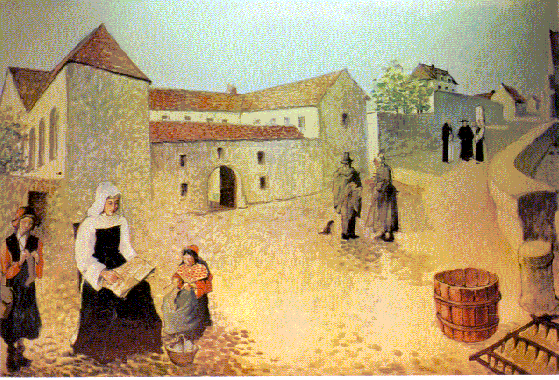Paris (France), 11/18/2020, Sr. Véronique Margron.- This year was meant to be a "year of grace", according to the decision of Sr. Maria Escayola Coris and her Council. It has enabled us to have a multitude of expressions and research on our charism, in the footsteps of our foundress: culture of encounter, closeness, sense of justice, importance of accompaniment, need for charity that is always creative, etc. We have received with attention and interest these contributions from the sisters of the whole congregation. This bubbling, which reveals what is in the secret recesses of the hearts of each one or in the privacy of the communities, is in itself a beautiful and just homage. To speak of a "year of grace" with regard to our year 2020 is very difficult. Because, to speak of grace in the midst of the pandemic, terrorism, human tragedies of migration and the economic and social crisis following covid-19 is very delicate and would seem out of place.
Grace
Yes, it is indeed a matter of grace. But not the grace that would erase or put to the background the evils of this world, the human tragedies, violence and absurdities.
It is this grace that is described as the “foolishness” of God. Its "superabundance" (Rom 5:20), its excess always. By following the idea of the Gospels and the letters of Paul, this grace escapes all calculation, control and greed. There is always something puzzling about it, whether it is His justice, mercy, forgiveness, resurrection or salvation. The grace is like this gesture of Jesus writing in the sand his signs that remained unknown and that would give back to the so-called adulterous woman her full dignity and future. The Gospel attests that grace is on the side of an event that challenges our calculation and what we consider as the probable, the possible, and even the necessary. From the extraordinary to the ordinary. It is like the joy that does not go away because it comes from the gratuitous relationship with the God of grace, from whom all life and peace come. Grace opens up our possibilities and even breaks with fatalism, especially when we experience or go through misfortune and pain.
God's grace calls us to live in freedom and hope.
So yes, it is indeed a year of grace, a life of grace, if we understand that this excess of God, his gift, calls for our participation. Not to own the grace, of course, but to take for oneself, the response to God's invitation to His justice, truth and art of loving, by interiorizing it. To unify one's thought and existence, knowing well that there are always deviations and faults, is the responsibility that falls on us, before the generous but inviting grace of our God.
And this is what Marie Poussepin really experienced when she founded in Sainville a small community of the Third Order of Saint Dominic and ratified this act, by signing on November 13, 1696, using the name Sr. Catherine, her name as Dominican tertiary, the deed of donation of the house of Sainville to Noëlle Menard, a novice called Sr Marie.
The meeting of grace and freedom marked her life, enabling her to create her community, Dominican in soul. It also created in her the audacity and unfailing obstinacy for the exercise of a kind, intelligent and inventive charity.
Time
Let us add that these years of foundation took place against the background of what the historian Paul Azard called the crisis of European consciousness, in other words the years 1680-1715, until the death of Louis XIV. These were the years of tremendous changes of political and social ideas in Europe. Little by little, over the course of these 35 years, the values that would characterize the Enlightenment were established in all the fields, and the ideas that would appear revolutionary around 1760, or even in 1789, were already being expressed around 1680.
Here is what he writes: "What a contrast! What a sudden shift! the hierarchy, discipline, order that authority takes care to ensure and dogmas that firmly govern life: this is what the men of the seventeenth century liked. Constraints, authority, and dogma: this is what the men of the eighteenth century, their immediate successors, hated [...] The majority of the French thought like Bossuet; suddenly the French are thinking like Voltaire: it is a revolution." (Paul Hazard, La Crise de la conscience européenne, 1680-1715 , Paris, 1935, Boivin. ; rééd. LGF Le Livre de poche, 1994.)
Thus, all the certainties of the time are shattered; at least they are deeply questioned, thus announcing the Age of Enlightenment (1715-1789) and with it the aspirations for a more just and educated society where men will be equal and free, a society free from prejudice, intolerance and fanaticism.
In our time we are witnessing another shattering of certainties through the rise of other forms of intolerances and new fanaticism, the pandemic and what it is doing to our Western ways of life and the aggravation of inequalities and the deep crisis of our Church.
To keep alive the memory of the springs of the social environment in which Marie Poussepin lived, to learn from the fruitful grace that inspired her own life, to read, reread and interpret the Scriptures in order to listen to the Spirit and discern our right place today, is a beautiful challenge for each one of us.
But above all, it calls for filiation.
